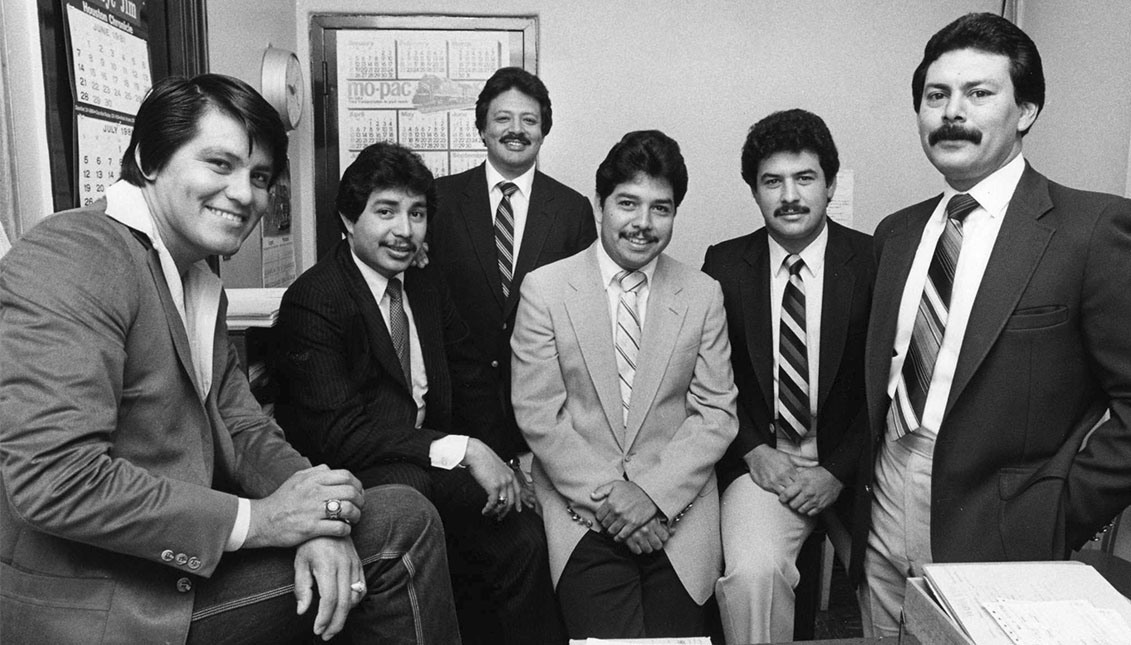
The Chicano Detective Brigade that was solved crimes in Houston's Latino community
The Chicano Squad was an example of diversity in the police force for 30 years. Now a podcast tells its story.
In the mid-1970s, Houston was experiencing one of the darkest periods of institutional violence against the Latino population in U.S. history.
Day after day, bodies appeared in the road, there were murders in cantinas and bar fights, and many drug-related deaths, but most cases were never solved.
However, the death of a young Mexican-American veteran at the hands of corrupt officials was to be the last straw for the community and forced the city's law enforcement agency, and especially its chief at the time, Harry Caldwell, rethink the shameful role the law was playing with its citizens of color.
It all goes back to 1977, when Jose Campos Torres was arrested in a Houston cantina after getting into a fight. Officers dragged him into the parking lot and brutally beat him. Not satisfied, they took him to prison, but he was so badly hurt that they refused to prosecute him and someone suggested that he be taken to the hospital.
To cover up the assault, the officers dragged him back to the shores of Buffalo Bayou and threw him into the water, where he drowned.
But nothing stays hidden on the bottom forever. Everything, including the most heinous crimes, eventually comes to the surface.
Campos Torres' body was found days later.
The death of the young Latino led to a barrage of protests against the police and Caldwell decided it was time to make efforts to regain trust. Two years later, he recruited a group of young Chicano officers who had no experience solving murders and gave them the mission to solve as many cases as possible, albeit with minimal resources.
Those 90 days became 30 years, and the so-called Houston 'Chicano Squad' became a legend and a symbol of the historic racial violence of the police and its necessary reform.
Journalist and writer Eva Ruth Moravec, then a young reporter, dedicated herself to covering their police work for the San Antonio Express.
The Chicano Squad became a symbol of the historic racial violence of the police and its necessary reform.
Moravec has been writing about the police and collecting data on deaths in custody and the shooting of unarmed people for years, and is the founder of the Texas Justice Initiative, a non-profit organization that collects, analyses and publishes data on criminal justice in the state.
Together with fellow writer and actress Cristela Alonzo, they are the creators of a new investigative podcast dedicated to telling the story of this little-known group of Chicano homicide detectives.

The idea of the podcast began when a member of the media company Frequency Machine found a small mention of the Chicano Brigade in a 2009 article published by Texas Observer, Moravec told the same newspaper in an interview.
Gathering testimonies from interviews and sending letters to family members and victims of that time was not an easy research task.
RELATED CONTENT
However, Moravec came across a key witness whose story shows the uneven way in which the Houston police dealt with injustices, and the difficulties this Chicano police force encountered in solving the community's crimes.
"In October 1987, baby Jessica, an 18-month-old white Texan, fell down a well in Midland and was pulled out in two days. Her story made national news. In October 1987, Liliana Reyes, a 14-month-old Texan, was kidnapped by an unknown man as a baby and was located by the Chicano team after 12 days. Her story unfolded at the same time as Jessica's and received no press attention," Moravec told the Texas Observer about the story, which is detailed in the seventh episode of the podcast.
"Understanding how Houston Hispanics lived and grew up is what made the Chicano Squad so successful"
When the Chicano Squad was disbanded in 2010, the argument was that the police force had become much more diverse — in fact, today Houston has a Hispanic police chief. But the unsolved crime rate remains high and is often concentrated in ethnic minority neighborhoods.
Was it a mistake to disband the ethnic police team? Was their Mexican-American origin focused on fighting crime within the community one of the keys to their three-decade mission?
"One thing that was important in their success was actually where they came from. They needed empathy to connect with the victims and witnesses; to be able to see them as victims and witnesses and also to gain the trust of the suspects. Understanding how Houston Hispanics lived and grew up is what made the Chicano Squad so successful," said Moravec.
But being Mexican-American in Texas is not the same as being Mexican-American in California or Ohio.
Chicano Squad addresses these issues while, through history and their testimonies, shedding light on racial violence and police neglect, and how an institution can become more diverse.
Progress has been, but times are still far from ideal. A major purge and reform of the police is needed to ensure the safety of all and to control covert excesses of power and brutality, such as in the murder of Campos Torres or the most recent victims like George Floyd and many more.
Episodes of Chicano Squad, produced by Vox Media, can be found on Apple Podcast.











LEAVE A COMMENT: